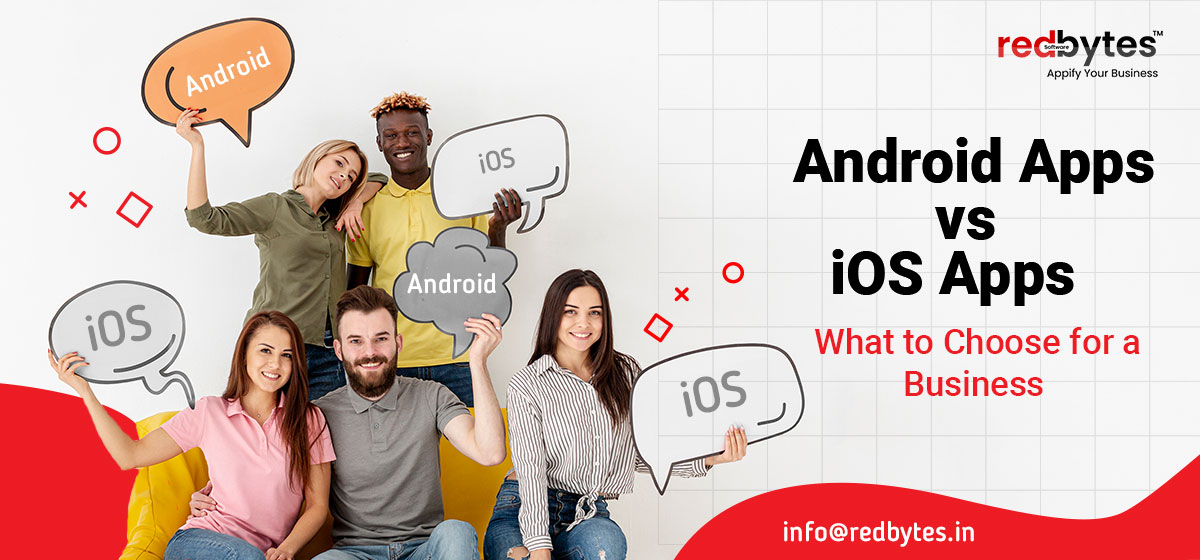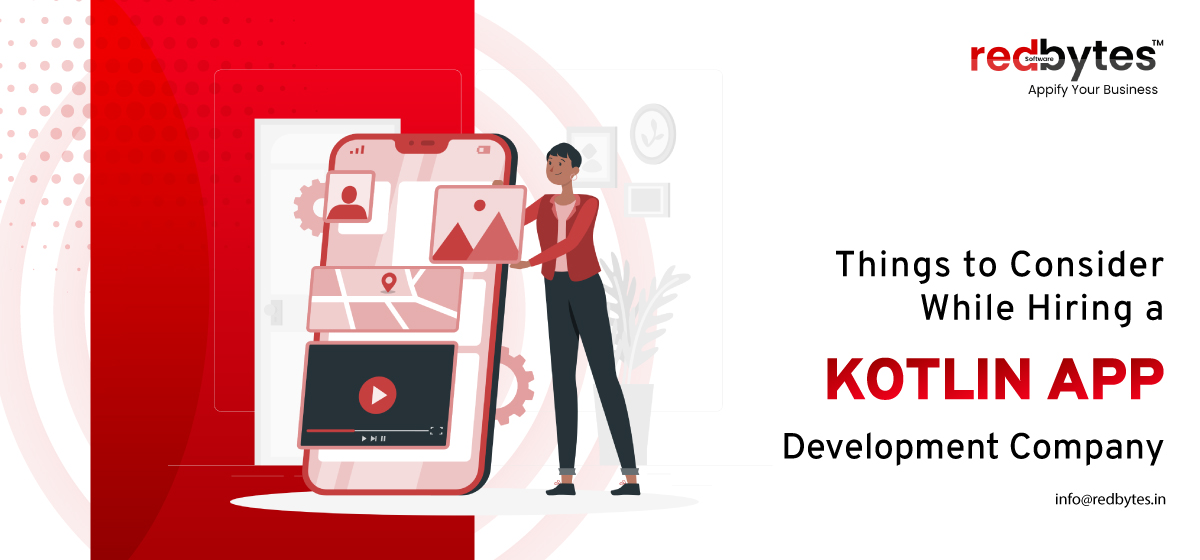Are you looking to kick-start your new business venture? Or are you looking for innovative ways to surpass your competitors and enhance the user base of your full-fledged business? Despite the size of the business, mobile apps have become a key element to reach more potential customers. Nowadays, people depend heavily on mobile apps than traditional websites to access products, information, and services.
It is common for businesses to consider building apps for both iOS and Android platforms to flourish their business and grab the attention of maximum customers. However, choosing one platform, at first, can help to cut down the cost and minimize the risk elements. Then comes the most important question—whether to choose iOS or Android for your business.
This is not an easy decision that can be taken hastily. It requires a lot of research and thinking to invest in the right platform.
Key Factors to Consider
It is always important to make informed decisions on any phase of your business to reap maximum benefits and to avoid unwanted surprises. This is even more crucial when deciding between iOS and Android platforms for your business app. A lot of factors must be taken into consideration, including targeted market and audience, exclusive business goals, overall budget, and a lot more. Let us have a closer look at the various key factors.
App Audience: Understanding the type of audience for your business and their geographical location, brand loyalty, and spending power matter a lot for an app’s success. For instance, Western Europe and North America are mainly dominated by Apple users, who always target premium customers, whereas Africa, Latin America, and Asia comprise mostly Android lovers.
If the idea is to launch an enterprise or an ecommerce app, it would be great to go for an iOS app, whereas Android would be the best choice if your goal is to attract maximum global customers. Let us glance through some interesting statistics regarding the different categories of people who prefer iOS and Android.
- On a general note, women users mostly prefer iOS over Android, whereas men are mostly inclined towards Android OS.
- iOS-based mobile users are usually categorized as more affluent and younger when compared to Android users.
- iOS user profiles, most of the time, are linked to those having higher education degrees, those with managerial or professional jobs, and more importantly, those who earn more than Android users.
And the last point has a lot to do with the spending power of users, which matters a lot when it comes to the monetization part. If we talk about spending power, both iOS and Android OS users showed a considerable increase in their spending nature last year. But, the overall money spent says that iOS users have more spending power than Android users.
In terms of brand loyalty, the iOS platform always had a loyal fan base, which switched from counterparts and never went back. But, in recent times, a reverse trend can be seen as many iOS users are switching to Android and other OS. According to some trusted sources, almost 1 out of 4 iPhone X users moved to Android last year.
Development Complexity: When it comes to the development part, experts have opined that iOS app development is far ahead in terms of easiness and fast execution. Developers end up spending at least 30 to 40% more time and effort to develop an Android application.
As Apple products are the only ones that run on iOS platforms, developers need to consider only limited types of devices while handling the design and testing. However, as Android OS is chosen by a range of manufacturers with varying device types, developers must do a lot of homework to make it compatible with all of them.

In terms of customization options, being an open-source system, Android offers better flexibility for developers to add a range of features according to convenience and based on business goals. This would make the final product more user-friendly and customers can be assured a great user experience.
However, in terms of approval, Apple has stricter rules and a lengthy review process, which might take a few days, whereas your Android app can get approval in few hours.
Monetization Strategy: Of course, every app should have a monetization strategy even if it is offered for free of cost in the store. The type of monetization strategy also counts when deciding the type of operating system. The strategies often include offering a paid app, advertising, in-app purchases, and more. If the plan is inclined towards subscriptions or in-app purchases, it would be a great idea to consider iOS. According to last year’s statistics, the revenue of iOS from these areas is almost double when compared to Android OS.
App Maintenance: Just like the development phase, another important area of a business app is its maintenance over the years. Timely update of OS is crucial for easy maintenance of any operating system. According to trusted sources, more than 50% of Android devices are currently running on operating systems that are out of date for almost 2 years or more. On the other hand, most of the devices running on iOS work on recent OS versions.
App Security: When talking about the security aspects, iOS is said to have better security and privacy features in comparison to Android OS. The reason for the added security of iOS is that it is a closed system. So, source code is not available to users and there is no way one can make changes to it, which, in turn, makes it really tough for hackers to detect vulnerabilities.
On the other hand, Android is an open-source system, and the code is made available for OS users and they can very well make any changes to it. Also, Android is used by different manufacturers in various device types. This makes it easy for hackers to try their luck with Android devices.
Overall Budget: Any business will have an estimated budget when it comes to developing exclusive apps. This should be another important area to be considered before finalizing the operating system. As we have discussed, 30 to 40% more effort and time is required to build an Android app and so is the case of expense.
However, in the case of app rollout time, Android is more reasonable. One just has to pay $25 in order to publish an Android app. Meanwhile, an iOS app needs $99 as payment in case of individual developers and a publishing company will have to pay $299.
Android vs iOS Market Share
A better market share of a mobile OS simply means that a greater number of users are having mobile phones running on that OS. Undoubtedly, Android is the winner in the run with a whopping margin over its counterpart. The global market share of Android has always been high in the last decade and it is expected to top the table in upcoming years as well unless we see some surprises.
According to June 2021 statistics of iOS vs Android market share, the worldwide market share of Android is close to 72%, whereas iOS, which is second on the list, has a share of 26%. In a 2016–2021 forecast survey, Google Play Store will see an impressive 196 billion annual downloads by the end of 2021, while the Apple store will see about 42 billion downloads.
Which Is More Profitable—Android or iOS?
When we evaluate the profitability of an operating system, the market share alone is not enough to reveal the whole story. The idea of business revenue that could be generated on different platforms gives you more clarity. Interestingly, contradicting the statistics of market share, iOS apps are on top of the table when it comes to business revenue even while holding a market share of less than 15%. This justifies the above-mentioned statement.

Remarkably, with innovative options, like in-app purchasing systems, multipurpose advertising platforms, and subscription services, both platforms have come a long way in boosting revenue. Let us take a quick look at some important statistics that will help you to have a clearer idea regarding the revenue part.
- About $111 billion revenue was in the account of iOS and Android OS in 2020, while 65% of the same was contributed by iOS.
- Close to 71% of this revenue came from game apps. Google Play Store contributed $31.9 billion, while the remaining $47.6 billion was from iOS apps.
- Subscription revenues alone contributed to $13 billion in 2020, out of which a whopping 79% was from iOS platform.
Mobile app revenue has contributed to the overall revenue for both iOS and Android, and we have seen a steady increase since 2016. However, the last three quarters witnessed major growth, and the reason is none other than the global lockdown and the effect of spending more time indoors.
Android vs iOS – Pros and Cons
When we compare two operating systems, there will be a few advantages for one OS in certain aspects, whereas it needs improvement in some other areas. However, considering the actual pros and cons, and analyzing how that will impact the business is the key. Let us have a look into the pros and cons of iOS and Android.
Android OS Pros
1.Open system: Being an open system, Android developers have access to a range of features during development, which gives more flexibility.
2.Design: An intuitive user interface can be a near reality as developers can make the best use of the extensive design guidelines of Google.
3.Fragmentation: This factor can be thought of as a disadvantage in the first place. But the reality is that it helps developers to make use of the Android design possibilities not only in mobile but also in a range of other devices, like TVs, wearables, in-car systems, and more.
4.Release: The publishing part of Android apps in the Google Play Store is relatively an easy process, which usually takes hardly a few hours.
Android OS Cons
1.Fragmentation: As we said, Android OS is now made available on a range of devices. So, developers will have a tough time adjusting the features to be compatible with various device types, screen sizes, etc.
2.Testing: As Android is available in a range of versions and devices, the QA team must extend the testing phase to cover all of these to avoid any bugs and compatibility issues.
3.Expense: The development phase is lengthy due to more coding and fragmentation issues, and the testing phase is lengthy too, as we have discussed. A longer duration means more associated expenses.
iOS Pros
1.Revenue: The biggest part of OS revenue comes from in-app purchases. iOS users usually have better spending power and thus, iOS makes huge revenue.
2.Device Types: There are only a limited number of devices from Apple that run on iOS, and developers find it easy to develop an app that is compatible with fewer device types and screen sizes.
3.UI design: The app design stage is comparatively easy as developers can make use of a detailed style guide from Apple for app UI.
iOS Cons
1.App release: Apple store has a set of stricter guidelines when it comes to app publishing. Poor performance, lack of valuable content, and security issues can be considered as reasons to reject your app. Also, they recommend real-life testing before approval and this process can take a few days.
2.Flexibility: With a lot of restrictions from Apple, developers will not have any flexibility for customization during the design phase.
Final Words
We can conclude that both iOS and Android app development have their own exclusive benefits and downsides. Preferring one over the other is just based on personal perspectives. While Android helps you to reach a broader audience, Apple users are more loyal and have the better spending power that can boost your revenue.
On a general note, highly skilled developers with expertise in their domain can make the development process easy and smooth despite the type of operating system. They will be able to make the best use of the possibilities of the platform to produce a great app. However, the final decision should be based on the type of business you are handling and the actual purpose of the app in your business.

















